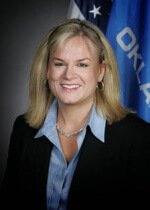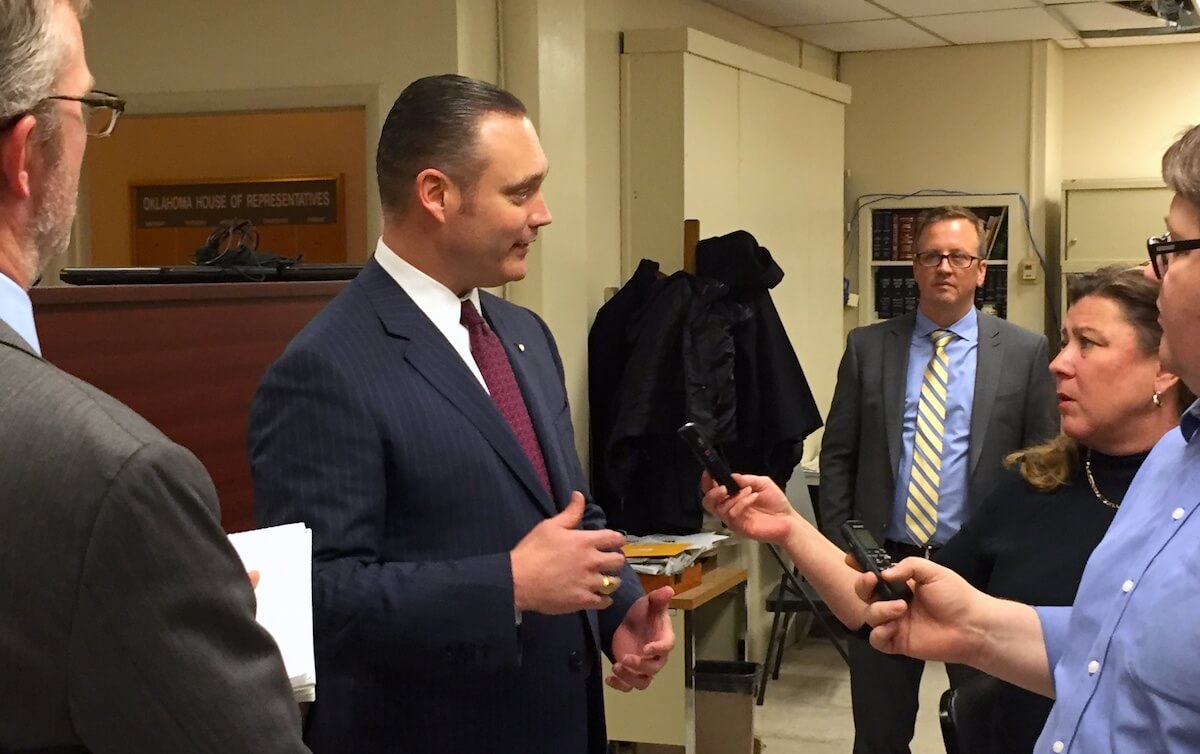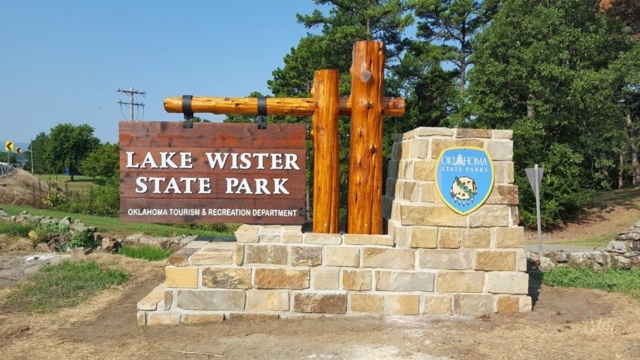A “hypothetical exercise” that underscores the serious nature of Oklahoma’s state revenue problems resulted in panicked TV news coverage about theoretical closure of some state parks Monday. By Tuesday, gubernatorial hopeful Gary Richardson had used those reports to criticize Gov. Mary Fallin and Lt. Gov. Todd Lamb for a new state hotel at Lake Texoma.
But state budget leaders are still sounding the alarm.
At issue is what would happen to certain state agencies if they received a 14.5 percent reduction in appropriations for next fiscal year.
Agency directors were asked that question by House Appropriations and Budget Chairwoman Rep. Leslie Osborn (R-Tuttle), who wanted to see the results of a scenario wherein common education would receive a flat budget as well as financing for the first year of a three-year teacher pay raise plan.

“That means we would have to cut other agencies 14.5 percent if we don’t do anything to correct our structural problems and address revenue,” Osborn told NonDoc on Tuesday. “Now, that doesn’t mean that’s what I would like to do. But I did think the agencies need to be prepared in case something like that was going to happen in the next few months.”
Osborn said she also thought “citizens across the state and their representatives and senators needed to see what the true implications were” of Oklahoma’s revenue problems.
“For instance, Joe Allbaugh told us at DOC that we’d have to release 2,500 prisoners,” Osborn said. “State parks, which are our third biggest economic driver in the state — tourism — said they’ll have to close 16 state parks and stop publishing Oklahoma Today Magazine.”
Those estimates by the Oklahoma Tourism and Recreation Department resulted in vague stories by Lawton’s KSWO and OKC’s KFOR that offered limited explanation of the “hypothetical exercise” Osborn had created.
OTRD email outlines state parks up for ‘hypothetical’ closure
In fact, “hypothetical exercise” was the subject line in Oklahoma Tourism and Recreation Department (OTRD) director Dick Dutton’s email explaining what a 14.5 percent cut might mean:
As I have said all the easy reductions have already been taken, so this left us with only two options to reach such a large number, state parks and marketing departments. Since OTRD has taken a number of budget cuts and all budgets are already tight, it had to be assumed that there would no carryover from FY’17 to help OTRD reach this reduction.
I would like to emphasize once again, this is a hypothetical exercise.
The park ranking system, developed by senior park staff was used to select designated parks. The parks included in this project were selected from the lowest rankings on the last updated list. Marketing departments were chosen in consultation between the OTRD’s administration and Travel Promotion.
The 16 parks and one golf course identified for closure consideration in the hypothetical scenario include:
- Talimena
- Great Plains State Park
- Cherokee Landing State Park
- Natural Falls State Park
- Red Rock Canyon State Park
- Great Salt Plains State Park
- Lake Eufaula State Park
- Lake Wister State Park
- Alabaster Caverns State Park
- McGee Creek State Park
- Foss Lake State Park
- Osage Hills State Park
- Greenleaf State Park
- Lake Texoma State Park
- Grand Lake State Parks
- Grand Cherokee Golf Course
- Boiling Springs State Park.
“I want to assure everyone that before we take any steps on any items mentioned in this email,” Dutton wrote, “we will look for every savings, every revenue source available and any other possibility to make sure that they are totally exhausted before any steps are taken that will impact the agency’s most valuable resource, its talented and professional personnel.”
‘Devastating and heartbreaking’
Leslie Blair, public information officer for the Tourism Department, said Dutton had about two and a-half days to respond to Osborn’s hypothetical scenario. She technically works for the Oklahoma Department of Commerce but handles media relations for Dutton’s agency as well since they office in the same building.
“I’m actually a part of the tourism budget cut,” Blair said with a slight laugh. “They asked me to handle their PIO duties as well (to save money).”
She said OTRD has taken a 38 percent cut in its appropriations since 2009. The agency now receives $17.3 million in appropriated dollars, which means a 14.5 percent reduction would cause cuts of $2.5 million. (The agency’s appropriated dollars in FY 2017, however, comprised only 15.5 percent of its overall funding.)
“It would be devastating and heartbreaking to have to close 16 state parks,” Blair said. “We are hopeful the Legislature can come to some type of solution. This is, of course, a worst-case scenario. But when we were asked, ‘How would you do this?’ This is where we are.”
Asked Tuesday morning about such a potential scenario if the Legislature fails to pass new revenue-raising measures, Oklahoma Secretary of Finance Preston Doerflinger was almost at a loss for words.
“What else is there left to say? These scenarios are going to continue to be rolled out, and they don’t look good,” Doerflinger said. “That really is where I’ve gotten. I don’t know what else to say. We’ve been saying, ‘This is what is coming.'”

‘Prove to the Legislature you are managing the money well’
While Doerflinger has sounded the alarm for new state revenue for more than two years, Osborn and House Speaker Charles McCall (R-Atoka) are in the position of gathering the votes necessary for passing any of a number of potential revenue options.
McCall spoke to reporters Tuesday in the Capitol press room and said revenue measures — like the cigarette tax and the fuel tax, among others — won’t be heard until later in the session because House members want to begin the full budget process first.
“They want to take those up after they’ve been through the budgeting process. Keep in mind we have 32 new members in the House (…) and they’ve never been through a budgeting process,” McCall said. “I do believe that all of (the proposed revenue measures) will be discussed in one form or fashion.”
The speaker said Osborn’s request for the effects of 14.5 percent agency cuts will help his caucus determine budgetary needs, but he said legislators must examine details with a critical eye.
“It’s easy just to say, ‘We’re going to make cuts.’ It’s easy just to say, ‘Let’s go raise revenue.’ What’s hard and what we need to do is make sure we’re rolling up our sleeves and make sure we’re looking at everything,” McCall said. “I’m quite certain that every agency out there can find efficiency in what they’re doing. (…) If the agencies can convince us that they’re doing a great job of that, then our members are much more open to the idea of other considerations.
“But until you prove to the Legislature you are managing the money well that we appropriate to you — because we are beholden to the people of Oklahoma, the taxpayers and those who elect us — we’re not just going to accept, ‘We’re going to turn prisoners loose and we’re going to cut services.’ We don’t want those things to happen, but you have to come prove to us that that’s the only alternative.”
OCPA’s Bond: Rein in wind subsidies
Oklahoma Council of Public Affairs vice president for advocacy Dave Bond views the scenario as another example of why legislators should act to eliminate or reform tax subsidies, particularly for wind power.

“If wind subsidies are reined in for the coming budget, that opens up a lot of possibilities and negates a lot of the sky-is-burning rhetoric that some folks are using,” Bond said. “If nothing is done to rein in subsidies for foreign and out-of-state wind companies, then agencies may face larger reductions. A teacher pay raise becomes much more difficult to accomplish.”
Bond, who touts on Twitter that the Tulsa World once called him “an anti-tax lobbyist,” said taxpayer priorities are often quite different from priorities discussed within the Capitol’s walls.
“I don’t catch a lot of gloom and doom from taxpayers — a lot of worry from them — about state parks,” Bond said. “They do want teachers to get a pay raise. They do want that, and it needs to happen.”
He also pondered the broader financial situation of state parks.
“We could ask ourselves, if a park is in danger of closing down without a state appropriation, is that park self-sustainable?” Bond said. “Are there enough people (…) to sustain that park? That’s a question we probably need to be asking as well.”
Gubernatorial candidate blames spending
Bond wasn’t the only person to play devil’s advocate about the hypothetical park closures Tuesday.

Gubernatorial hopeful Gary Richardson sent out a press release blasting a 2012 bill that took money from the State Park Trust to help fund Lake Murray State Lodge, which had its grand opening Feb. 22.
“The raiding of the State Park Trust to fund this hotel is ‘Exhibit- A’ of why Oklahoma doesn’t have a revenue problem, but a spending problem,” Richardson said in his release. “The original intent of the State Park Trust was to make the Oklahoma state parks less reliant on taxpayer funding through royalty payments from drilling and other fees. But our leaders instead decided to raid the trust in 2012 and now the chickens have come home to roost.”
Film tax rebate could be examined
Another controversial state expenditure is also tied to the OTRD: the Oklahoma Film Rebate program. The state’s Incentive Evaluation Commission reviewed the tax rebate for movie productions in Oklahoma and eventually recommended its allowed sunset in 2024.
But the commission’s report on the rebate said the program is not achieving its goals, despite costing anywhere between $900,000 and $6.5 million a year over the five most recent fiscal years on record.
“There is no evidence that the Oklahoma film industry has strengthened during the time period when the rebate has been available,” the report stated.
Osborn said lawmakers may need to examine the film tax rebate if a major cut to the OTRD would mean such broad park closures.
“To be honest, that’s one of the things we will look at,” Osborn said. “At the end of the day, with however the budget comes out, we probably will look at line-iteming at lot of things. We haven’t done that a lot in the last few years. I think we need to get back to that so that we actually show intent on what we would like to be funded or not funded. ”
Setting line items and budget limits can offer legislators control over how agencies prioritize their appropriated dollars.
“I will say, Tourism has had some draconian cuts the last two years. They didn’t only get their normal cut, they also received caps on that apportionment fund that they have received, and that happened last year,” Osborn said. “So my hope is that we don’t have to do any of those measures, but I did think we need to have the scenario out there of here’s what happens if we don’t address revenue.”






















